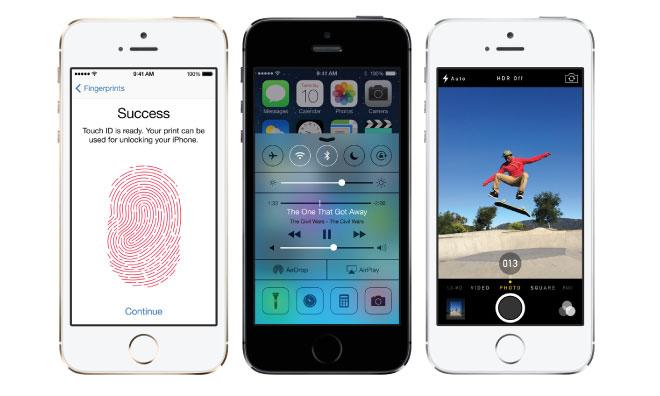Despite seeing release some eight months after the iPhone 5s and 5s, Samsung's latest Galaxy S5 flagship is still behind the Apple handsets in Europe, though the Korean company's flagship is taking away customers in key Euro markets.
For its first full months of sales in Europe, Samsung's Galaxy S5 came in as the third highest selling handset behind the older iPhone 5s and 5c, according to the latest smartphone sales data statistics from Kantar Worldpanel. The big-five European markets include the UK, Germany, France, Italy and Spain.
The research firm notes, however, that 17 percent of those who purchased the S5 were previously Apple device users. Existing Samsung customers accounted for 58 percent of S5 sales.
"In general, consumers buying the Galaxy S5 were primarily attracted by its large screen size," said Kantar Worldpanel ComTech strategic insight director Dominic Sunnebo. "This is something Apple is likely to address with the rumoured larger screen iPhone 6 launch expected in late September.
Overall, Android still control the European market with a 73.3 percent marketshare, compared to the 16.6 percent share for iOS and 8.1 percent for Windows. That Android's marketshare is not gaining significantly over iOS suggests platform mix is rising, meaning Samsung and Apple have been trading customers over the past month.
Europe's results contrast those of the U.S., where the Galaxy S5 was the second highest selling smartphone in May. Over the past three months, Apple's iPhone 5s remained the top-selling the device, but Samsung took the top spot in overall brand sales with 36.8 percent of the market versus 32.5 percent for Apple.
Apple is widely expected to launch a next-generation "iPhone 6" with two screen sizes, a 4.7-inch and 5.5-inch version. With the rumored upcoming iPhones, Apple is encroaching on Samsung's space by fielding a so-called "phablet" device, though it remains unclear how popular a large-screen iPhone will be.
 AppleInsider Staff
AppleInsider Staff








 Charles Martin
Charles Martin
 Christine McKee
Christine McKee
 Wesley Hilliard
Wesley Hilliard
 Malcolm Owen
Malcolm Owen
 Andrew Orr
Andrew Orr
 William Gallagher
William Gallagher
 Sponsored Content
Sponsored Content







24 Comments
iPhone 5s and 5c leads and Samsung's Galaxy S5 came in as the third highest selling handset but only 16.6 percent share for iOS. Wonder how many Android phones flooding for Android 73.3 percent marketshare.
[quote name="AppleInsider" url="/t/181085/apples-iphone-5s-and-5c-leads-in-europe-but-platform-mix-rises-with-samsungs-galaxy-s5-debut#post_2558482"]Apple is widely expected to launch a next-generation "iPhone 6" with two screen sizes, a 4.7-inch and 5.5-inch version.[/quote] I certainly hope they also will sell a 4" iPhone as I'm not in the market for a larger one. Yes, with the same 2014 HW additions, not a 5s with 'simply a new CPU'
Story and headline all about Apple iPhone 5s and 5c and Samsung S5. But lame photo of unannounced/mock-up products that aren't the focus of the story. Thanks, AI. /s.
Can't comment on European numbers as I don't have info. But recent articles on the web have shown that iOS INSTALLED base is closer than people think or sales suggest. In the I/O conference Google said they had an installed base of 1 billion vs the analyst estimate of iOS installed base of 500m to 750m. With longer lasting, more expensive products and better OS updates people keep their iOS devices longer or pass them to others when they are upgrading to the next model.
"Overall, Android still control the European market with a 73.3 percent marketshare, compared to the 16.6 percent share for iOS and 8.1 percent for Windows." Windows has half as much marketshare as iOS? Really?! I doubt it. This is only anecdotal evidence on my part, but I've only ever seen two Windows phones in the wild, and one of these was owned by the guy I sat next to at work.